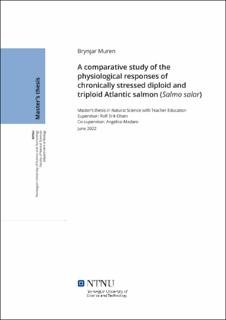| dc.contributor.advisor | Olsen, Rolf Erik | |
| dc.contributor.advisor | Madaro, Angelico | |
| dc.contributor.author | Muren, Brynjar | |
| dc.date.accessioned | 2022-09-27T17:21:33Z | |
| dc.date.available | 2022-09-27T17:21:33Z | |
| dc.date.issued | 2022 | |
| dc.identifier | no.ntnu:inspera:108834379:15964227 | |
| dc.identifier.uri | https://hdl.handle.net/11250/3021939 | |
| dc.description.abstract | Rømt oppdrettslaks (Salmo salar) regnes for å være en av de største truslene som påføres ville populasjoner av Atlantisk laks grunnet introgressiv hybridisering. Dette kan unngås ved å indusere sterilitet i oppdrettslaksen, noe som er mulig i kommersiell skala gjennom triploidisering. Triploid laksefisk har vist høyere mortalitet og lavere yteevne i kommersiell produksjon, noe som indikerer redusert dyrevelferd. Lite er kjent om triploid laks sin fysiologi. Denne studien tok sikte på å utforske den triploide stressfysiologiden under kroniske stressforhold for å få innsikt i hvordan laksen mulig håndterer suboptimale forhold i kommersiell sammenheng.
I denne studien ble triploid og diploid Atlantisk lakseparr utsatt for en uforutsigbar kronisk stress (UKS)-test over en tre ukers periode. Etter testen ble fisken eksponert for en ny stressor-test sammen med kontrollgrupper, og plasmaprøver ble analysert for HPI-akse aktivering og fysiologisk håndtering av akutt stress. Begge ploidier responderte på UKS-testen med en redusert spesifikk vekstrate (SGR) og en økt forkonverteringsratio (FCR). Det var ingen statistisk forskjell mellom ploidienes UKS respons i SGR og FCR. Kronisk stressede triploider hadde høyere grunnverdier i sirkulerende kortisol sammenlignet med sin kontrollgruppe, mens kronisk stressede diploider hadde lignende kortisolverdier som den diploide kontrollgruppen. Sirkulerende adrenokortikotropt hormon (ACTH) viste inkonsistent effekt av UKS, hvor stressede triploider hadde de høyeste verdiene, mens stressede diploider hadde de laveste verdiene av alle gruppene. Sammenlignet med vekst ble grunnverdier i plasma (ACTH, cortisol, Na+, Cl-, laktat, glukose) evaluert som upålitelige indikatorer for opplevelsen av kronisk stress i dette eksperimentet.
Både kronisk stressede og kontrolltriploider responderte på akutt stress-testen med en høyere utskillelse av både ACTH og kortisol sammenlignet med de diploide, noe som ikke var forventet. På tvers av analyser (ACTH, cortisol, Na+, Cl-, K+, laktat, glukose) konkluderer vi at UKS har lignende effekter på den akutte stressresponsen for begge ploidier. Sammenlignet med kronisk stresset fisk har naiv fisk en større akutt stressrespons og erfarer økt allostatisk belastning, spesielt triploider. Dette eksperimentet peker ikke på opplevelsen av kronisk stress som en enkeltstående faktor i å forklare den lavere ytelsen til triploid laks i opprett. Triploid laks virker ikke å erfare lavere velferd en diploid laks under kroniske stressforhold. | |
| dc.description.abstract | Farmed Atlantic salmon (Salmo salar) escapees is regarded as one the greatest threats imposed on the wild Atlantic salmon due to introgressive hybridization. This can be avoided by inducing sterility in the farmed salmon, which is commercially possible through triploidization. Triploid salmonids have shown to have higher mortalities and in general lower performance in commercial settings, indicating a concerning reduced animal welfare. The knowledge of the triploid salmon physiology is scarce. This study aimed to investigate the triploid stress physiology under chronic stress conditions to gain insights to how the salmon might cope with suboptimal conditions in aquaculture settings.
In this study, triploid and diploid Atlantic salmon parr were exposed to an unpredictable chronic stress (UCS) trial over a three-week period. The fish were then exposed to a novel stressor trial together with respective control groups, and plasma was analysed for HPI-axis activation and physiological coping under acute stress. Both ploidies responded similarly to the UCS trial with a reduced specific growth rate (SGR) and increased feed conversion ratio (FCR). There was no statistical difference between the ploidy UCS response in SGR and FCR. Chronically stressed triploids had higher baseline circulating cortisol than the respective control group, while chronically stressed diploids had similar cortisol values to the diploid control. Circulating (adrenocorticotropin releasing hormone (ACTH) showed inconsistent effects of UCS, with the highest value in stressed triploids, while stressed diploids had the lowest value of all the groups. Compared to growth, baseline plasma values (ACTH, cortisol, Na+, Cl-, lactate, glucose) were in this experiment evaluated as inconsistent indicators for experiencing chronic stress.
Both chronically stressed and control triploids responded to the novel stressor trial with a higher release of both ACTH and cortisol compared to the diploids, which was not expected. Across analysis (ACTH, cortisol, Na+, Cl-, K+, lactate, glucose) we conclude that UCS had similar effects on the acute stress response for both ploidies. In comparison to chronically stressed fish, naïve fish had a larger novel stressor response, experiencing a great allostatic load, particularly the triploids. This experiment does not point to the experience of chronic stress as a sole factor explaining lower performance of triploid salmon in aquaculture. Triploid salmon does not seem to experience lower overall welfare than diploid salmon under chronic stress conditions. | |
| dc.language | eng | |
| dc.publisher | NTNU | |
| dc.title | A comparative study of the physiological responses of chronically stressed diploid and triploid Atlantic salmon (Salmo salar) | |
| dc.type | Master thesis | |
